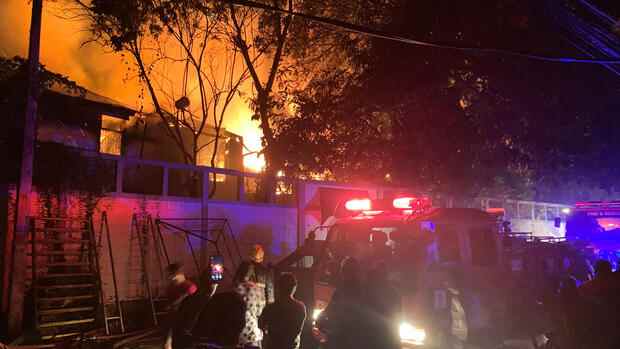Protesters entered the building and set it on fire.
(Photo: AP)
Colombo After ongoing protests against the severe economic crisis in Sri Lanka, President Gotabaya Rajapaksa has agreed to resign next Wednesday, according to the Speaker of Parliament. Prime Minister Ranil Wickremesinghe had previously announced his resignation. Dinouk Colambage, spokesman for Wickremesinghe, said he would step down once all parties had agreed to form a new government.
Tens of thousands protested in Colombo on Saturday against the consequences of the economic crisis and demanded that the government and president resign. They broke through barriers and stormed President Rajapaksa’s residence and office. They later also entered Prime Minister Wickremesinghe’s private home and set it on fire.
After the storming of Rajapaksa’s residence, the leaders of the parties met in Parliament and called for his and Wickremesinghe’s resignation. Opposition MP Rauff Hakeem tweeted that the post of head of state should temporarily be handed over to Parliament President Mahinda Yapa Abeywardena. There should be an all-party government and new elections.
Parliament Speaker Abeywardena later said on TV Saturday that he informed Rajapaksa of the meeting. Rajapaksa has agreed to step down but will remain in office until Wednesday to ensure an orderly transfer of power, Abeywardena said. He called people to be calm.
Top jobs of the day
Find the best jobs now and
be notified by email.
Police used tear gas as protesters stormed the residence and office of President Rajapaksa. A scuffle ensued. At least 34 people were injured, including two police officers. A representative from the national hospital said two of the injured were in critical condition.
Demonstrators stormed the palace.
(Photo: AP)
Private TV station Sirasa said at least six of its employees, including four reporters, were taken to hospital after they were beaten by police while covering the protest near Wickremesinghe’s home.
Wickremesinghe had only been in office since May. He said the country was facing a fuel crisis, food shortages, the head of the World Food Program was expected and there were several issues to discuss with the International Monetary Fund. “Therefore, if this government goes, there should be a new one,” he said.
Tens of thousands of people gathered in the city to demand the resignation of Rajapaksa and the government. The police used tear gas against demonstrators.
(Photo: AP)
Sri Lanka is suffering from the worst economic crisis since independence in 1948. Essential goods are scarce. Many people have trouble getting food, fuel, and other essentials. Sri Lanka announced in April that it would not continue to repay its foreign debt for the time being because it did not have enough foreign currency. They amount to around 50 billion euros.
More: “Debt crisis with domino effect”: In these countries, there is a risk of national bankruptcy
